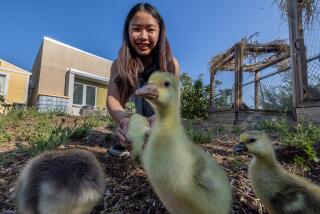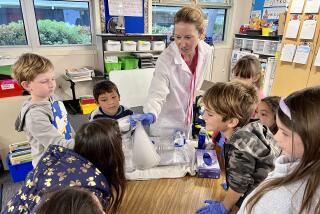Schools : Students Apply Science Principles to Their Lives : Learning: Seventh- and eighth-graders at Gidley Elementary are challenged to create projects that answer questions from everyday existence.
- Share via
Seventh- and eighth-graders at Gidley Elementary in El Monte are learning that science isn’t all textbooks and test tubes.
It can also be a way to measure which basketball shoes jump the highest, or what acne cleanser works best.
Gidley students are putting the scientific method to the test in a school contest that challenges them to apply rigorous standards of inquiry to the daily puzzles they encounter.
“This shows how science is connected to life, how it’s connected to everyday things--whether it’s the products you buy or the things you’re curious about in your environment,” said Gidley science teacher Marilyn Coffin.
Students think of a question, formulate a hypothesis, conduct an experiment and develop a graph of their results on a computer. The process takes from October to March, and the final projects went on display March 25.
Grand prize winner Lisa Tseng won a $100 savings bond for her experiment showing how temperature variations affect whether fruit flies have curly or straight wings, or longer or fatter bodies.
This is the contest’s ninth year; last year, 22 entries from the school went on to the county fair in Pomona; 16 won awards, including best of show.
Although students learn the methodology in science class, an after-school workshop held three to four days a week helps them put it into practice. Students aren’t required to complete a project, but about 230 of the 300 seventh- and eighth-graders did.
“It’s not as uninteresting as I thought it was,” conceded eighth-grader Desiree Millsaps, who tested mouthwashes to determine which brand kills bacteria best.
Eighth-grader David Hong turned an interest in recycling into an experiment about which type of paper--white, brown or newsprint--recycles best.
Hong shredded the paper, mixed it in a blender and pressed it himself. Newsprint, he found, was the strongest, and white paper the best for writing. To make sure, he used it for his homework.
“Recycling is good for the Earth and we can reduce waste by doing it,” he concluded.
Norma Moreno received $20 for her prize in this year’s contest. She won high marks for her project on which solution keeps roses fresh longest. Moreno tested roses with and without leaves in solutions of aspirin, sugar, flower preservative and plain water, and found roses kept longest without leaves, in water alone.
Completing a project helps children learn to teach themselves, Coffin said. “We try to get them to focus on how they learn rather than how a teacher teaches,” she said.
More to Read
Sign up for Essential California
The most important California stories and recommendations in your inbox every morning.
You may occasionally receive promotional content from the Los Angeles Times.










